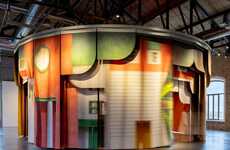
Gregor Sailer's 'Potemkin Villages' Highlight Fake Cities Around the World
References: gregorsailer & archdaily
Potemkin Villages are fake cities. The name itself stems from an 18th century dictum from Catherine the Great commanding Field Marshall Potemkin to build artificial settlements that would disguise the dereliction she faced along her route to Crimea. The term has since expanded to include fake cities designed for all sorts of reasons, and Gregor Sailer has used it as the title of his new photography book on the subject of fake cities around the world.
Some Potemkin Villages are designed for tourism. In China, for examples, there are complete town centers that replicate the sleepy architecture of quaint British hamlets, and these are popular domestic tourist destinations for the Chinese. Other world Potemkin Villages are more sinister: a US town called Junction City is designed to train soldiers for fighting in Middle Easter towns, for example.
Some Potemkin Villages are designed for tourism. In China, for examples, there are complete town centers that replicate the sleepy architecture of quaint British hamlets, and these are popular domestic tourist destinations for the Chinese. Other world Potemkin Villages are more sinister: a US town called Junction City is designed to train soldiers for fighting in Middle Easter towns, for example.
Trend Themes
1. Fake City Tourism - The rise of Potemkin Villages designed for tourism creates opportunities for companies to innovate and provide unique experiences for travelers.
2. Military Training Cities - The use of fake cities for military training purposes presents opportunities for defense and technology companies to develop new training technologies and simulation systems.
3. Eco-friendly City Design - The creation of sustainable and eco-friendly fake cities can disrupt traditional construction industries and provide innovative solutions for urban planning.
Industry Implications
1. Tourism - Tourism industries can capitalize on the growing popularity of Potemkin Villages and offer new immersive experiences for travelers.
2. Defense - Defense companies can develop advanced simulation technologies to improve training effectiveness and create more realistic training environments.
3. Construction - The use of eco-friendly materials and design in fake city construction can revolutionize the construction industry and provide sustainable solutions for urban planning.
6.9
Score
Popularity
Activity
Freshness























